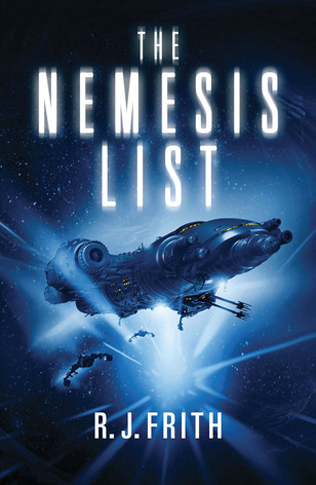
The Nemesis List, by R.J. Frith (Tor, 2010)
SciFiNow magazine and Tor UK ran a competition for debut sf novels, which this won: so, hopes were high.
Unfortunately what we get is fairly routine downbeat space opera owing more than a little to Firefly: ex-military space trader with heart of gold, surgically enhanced psychic genius, oppressive government … To be fair these are common tropes and Frith does his own thing with them. Just not that much.
From the age of five, Jones was tortured in a secret scientific facility to enhance his intelligence and memory. Now in his twenties, he has been tracking down and killing off the faculty of the facility, one by one; he has been apprehended again; and Frank Pak, our heart-of-gold freelance hero, has the job of transporting him from A to B while nefarious persons from all around want to get hold of him for themselves.
It sounds good, so where does it go wrong?
Jones is frankly useless: how he got as far as he did down his list is a mystery. He is a physical and emotional wreck, liable to collapse at any moment, and any situation that he takes control of inevitably goes horribly wrong.
There is no sense of place anywhere in this future universe. It is a random collection of destinations with no sense of the links or distances between them, stocked exclusively with people of European or North American descent: Frank Pak’s name is about as wildly exotic as it gets.
The technology of the future already looks clunky to a reader living in a time when cloud computing can be accessed from a handheld device. No one would entertain thoughts, as Pak does, about smoke coming out of the comp unit that has to keep track of traffic at a busy space station. Computers can count quite high, you know. And job share.
The oppressive government … isn’t, as far as this reader could tell. There is no discernible censorship of thought or expression; private owners of spaceships can ply their trade as they please, subject only to quite reasonable traffic regulations, much like present day commerce; and if the government does intervene excessively it’s to stamp out such things as freelance experiments on surgically enhancing the brain power of young children, which measures would not raise an eyebrow in many western democracies. Meanwhile, for readers trying to make sense of it all, everyone has those deep, elliptical conversations where the speakers can already see ahead by two or three levels of implication, making the dialogue and hence the motivation of characters just impenetrable. And too many sentences with no verb.
The biggest flaw is that everything is as it is because the author says so. The government is rotten because we’re told so; Jones is a genius because he just is, okay?
The actual plot is involved and makes sense. There will doubtless be more novels; Frith could do worse than develop a universe that lives up to the promise of his ideas.
